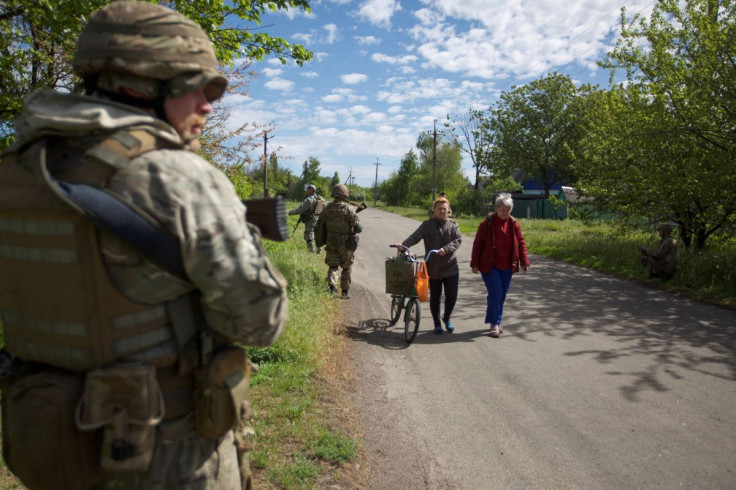Russian Forces Come Closer To Encircling Ukraine Troops In East

Advancing Russian forces came closer to surrounding Ukrainian troops in the east, briefly seizing positions on the last highway out of a crucial pair of Ukrainian-held cities before being beaten back, a Ukrainian official said on Thursday.
Three months into its invasion of Ukraine, Russia has abandoned its assault on the capital Kyiv and is trying to consolidate control of the industrial eastern Donbas region, where it has backed a separatist revolt since 2014.
Thousands of troops are attacking from three sides to try to encircle Ukrainian forces in Sievierodonetsk and Lysychansk. If the two cities straddling the Siverskiy Donets river fall, nearly all of the Donbas province of Luhansk would be under Russian control.
"Russia has the advantage, but we are doing everything we can," said General Oleksiy Gromov, deputy chief of the main operations department of Ukraine's general staff.
Luhansk governor Serhiy Gaidai said around 50 Russian soldiers had reached the highway and "managed to gain a foothold", even setting up a checkpoint.
"The checkpoint was broken, they were thrown back ... the Russian army does not control the route now, but they are shelling it," he said. It was possible Ukrainian troops would leave "one settlement, maybe two. We need to win the war, not the battle," he said.
"It is clear that our boys are slowly retreating to more fortified positions - we need to hold back this horde," Gaidai added.
Western military analysts see the battle for the two cities as a potential turning point in the war, now that Russia has redefined its principal objective as capturing the east.
'SOBERING'
Reuters journalists in Russian-held territory further south saw proof of Moscow's advance in Svitlodarsk, where Ukrainian forces withdrew earlier this week.
The town is now firmly under control of pro-Russian fighters, who have occupied the local government building and hung a Soviet hammer and sickle flag at the door.
Drone footage filmed by Reuters of the nearby abandoned battlefield showed craters pockmarking a green field surrounded by wrecked buildings. Pro-Russian fighters were milling about in trenches.
Russia's recent gains in the Donbas follow the surrender of Ukraine's garrison in Mariupol last week, and suggest a shift in momentum after weeks in which Ukrainian forces had advanced near Kharkiv in the northeast.
"Recent Russian gains offer a sobering check on expectations for the near term," tweeted defence analyst Michael Kofman, director of Russian studies at the U.S.-based CNA think-tank.
Russian troops have broken through Ukrainian lines at Popasna, south of Sievierodonetsk, and are threatening to encircle Ukrainian forces, he wrote.
Ukrainian interior ministry adviser Vadym Denisenko told a briefing 25 Russian battalions were attempting to surround the Ukrainian forces.
The head of Ukraine's armed forces, Valeriy Zaluzhny, called on Telegram for more Western arms, particularly "weapons that will allow us to hit the enemy at a big distance".
Russia's foreign minister, Sergei Lavrov, later warned that any supplies of weapons that could reach Russian territory would be a "a serious step towards unacceptable escalation".
HOMES DESTROYED
A few weeks ago, it was Ukrainian forces that were advancing, pushing Russian troops back from the outskirts of Kharkiv towards the Russian border.
But Moscow appears to have halted its retreat there, retaining a strip of territory along the frontier and preventing Ukrainian troops from cutting Russian supply lines that run east of the city to the Donbas.
Russian shelling killed at least seven civilians and wounded 17 in Kharkiv, local authorities said, as Russian forces dug in and maintained control of positions in villages to the north.
"It's loud here but it's home at least," said Maryna Karabierova, 38, as another blast could be heard nearby. She had returned to Kharkiv after fleeing to Poland and Germany earlier in the war. "It can happen at any time, at night, during the day: this is what life is here."
Russia did not immediately comment on the situation in Kharkiv. It has denied targeting civilians in what it calls its "special military operation" in Ukraine.
The Donbas advance has been backed by massive artillery bombardment. Ukraine's armed forces said more than 40 towns in the region had been shelled in the past 24 hours, destroying or damaging 47 civilian sites, including 38 homes and a school.
ESCALATION
Western countries led by the United States have provided Ukraine with long-range weaponry, including M777 howitzers from Washington and Harpoon anti-ship missiles from Denmark.
Washington is even considering providing Kyiv with a rocket system that can have a range of hundreds of kilometers, and has held discussions with Kyiv about the danger of escalation if it strikes deep inside Russia, U.S. and diplomatic officials told Reuters.
"We have concerns about escalation and yet still do not want to put geographic limits or tie their hands too much with the stuff we're giving them," said one U.S. official, speaking on condition of anonymity.
Ukraine's foreign minister, Dmytro Kuleba, said during a question and answer session over Twitter that "without multiple launch rocket systems, we won't be able to push them back." He said that if Russia were to request a ceasefire, "we will think twice, three times before agreeing to it".
Kremlin spokesperson Dmitry Peskov said Moscow expects Ukraine to accept its demands at any future peace talks. It wants Kyiv to recognise Russian sovereignty over the Crimea peninsula Moscow seized in 2014, and the independence of separatist-claimed territory.
German Chancellor Olaf Scholz said Putin must not be permitted to impose peace terms.
"There will be no dictated peace," Scholz said in Davos. "Ukraine will not accept this, and neither will we."
© Copyright Thomson Reuters 2024. All rights reserved.







